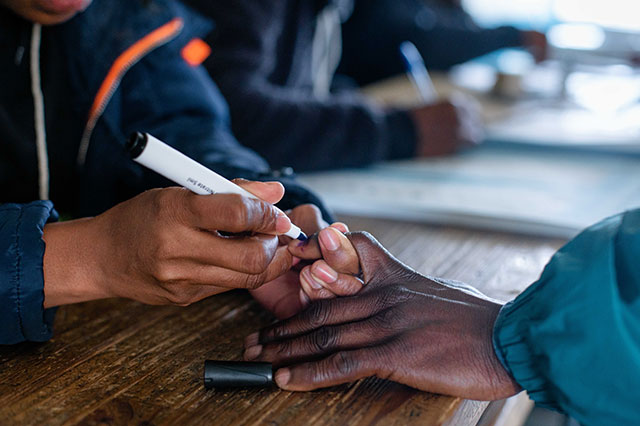Maseru – Voters draped in traditional shepherd’s blankets cast their ballots on Friday in parliamentary elections in Lesotho, but observers saw little prospect of an end to the country’s long-running political gridlock.
The southern African kingdom has been governed for the past decade by frail and fractious coalitions, with no premier serving out a full five-year term.
Some voters walked for kilometres (miles) or queued for hours to reach polling booths set up at schools or sometimes under marquees on the grass.
“I’m confident that our next prime minister will bring us better life and better conditions,” Mamete Potsane, 74, told AFP.
Wearing a floral sweater and sneakers, the widow, who lives on a government allowance of 800 maloti ($44) a month, gave a thumbs-up as she left a voting station at the foot of picturesque Mount Qiloane.
Polls closed at 1500 GMT and counting started shortly afterwards. The result is likely to be announced next week.
Instability
Surrounded entirely by South Africa, Lesotho is a mountain nation of two million people nicknamed the “Kingdom in the Sky.”
It has been buffeted by coups and attempted coups since independence from Britain in 1966, and nearly a third of its population live on less than $1.90 a day.
“We’ve lost hope,” said Mpho Mochaka, 26. A street vendor selling cigarettes and apples in the capital, Maseru, she said she did not vote.
Today, 07/10/22, elections are held in Lesotho. The #SEOM Head of Mission, Minister of Defence and Veterans Affairs of Namibia, Hon. Frans Kapofi, accompanied by His Excellency Mr Elias Magosi, SADC Executive Secretary, and the SEOM teams, observed the elections as Basotho voted pic.twitter.com/abLtMDgCpk
— SADC Secretariat (@SADC_News) October 7, 2022
The outgoing government is led by the All Basotho Convention (ABC). But current Prime Minister Moeketsi Majoro did not seek another term, after being ousted as party head earlier this year.
His predecessor Thomas Thabane was forced to step down in 2020 after being accused of ordering the murder of his estranged wife. Charges against him were dropped in July.
The ABC’s new leader, former health minister Nkaku Kabi, squared off against an array of contenders.
More than 50 parties were in the running.
Millionaire challenger
Kabi’s main challengers included Mathibeli Mokhothu, who heads the Democratic Congress – Lesotho’s second largest party – and Sam Matekane, a millionaire believed to be the country’s richest man who could be a dark horse, according to analysts.
No one is expected to win outright, darkening prospects of much-needed reform, said Seroala Tsoeu-Ntokoane, a political researcher at the National University of Lesotho.
“Coalitions are a source of instability because they’re formed with political parties with not much to hold them together, no mutual policy platform, no mutual respect,” she said.
The outgoing parliament failed to pass a law aimed at strengthening political stability, by banning lawmakers from switching party allegiance within the first three years of their tenure.
ALSO READ | Lesotho since independence: coups, turmoil and murder
“We want infrastructures, roads and running businesses, it’s all about bringing back hope in the country,” said Mekhotak Setsebi, 30, a blanket tied around his shoulders.
He is the head of a small logistics company but business is bad, he said before casting his ballot in Maseru’s suburb of Matala.
The 120-seat parliament is chosen by a mixed electoral system – 80 lawmakers are voted in by constituents, while another 40 seats are distributed proportionally.
About 1.5 million people were registered to vote. Turnout in the last elections in 2017 was only 47 percent, but some observers said the figure could be higher this year.
Follow African Insider on Facebook, Twitter and Instagram
Source: AFP
Picture: Twitter/@SADC_News
For more African news, visit Africaninsider.com


